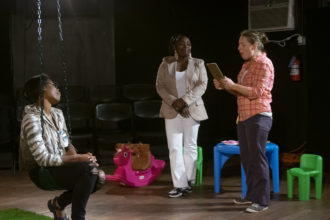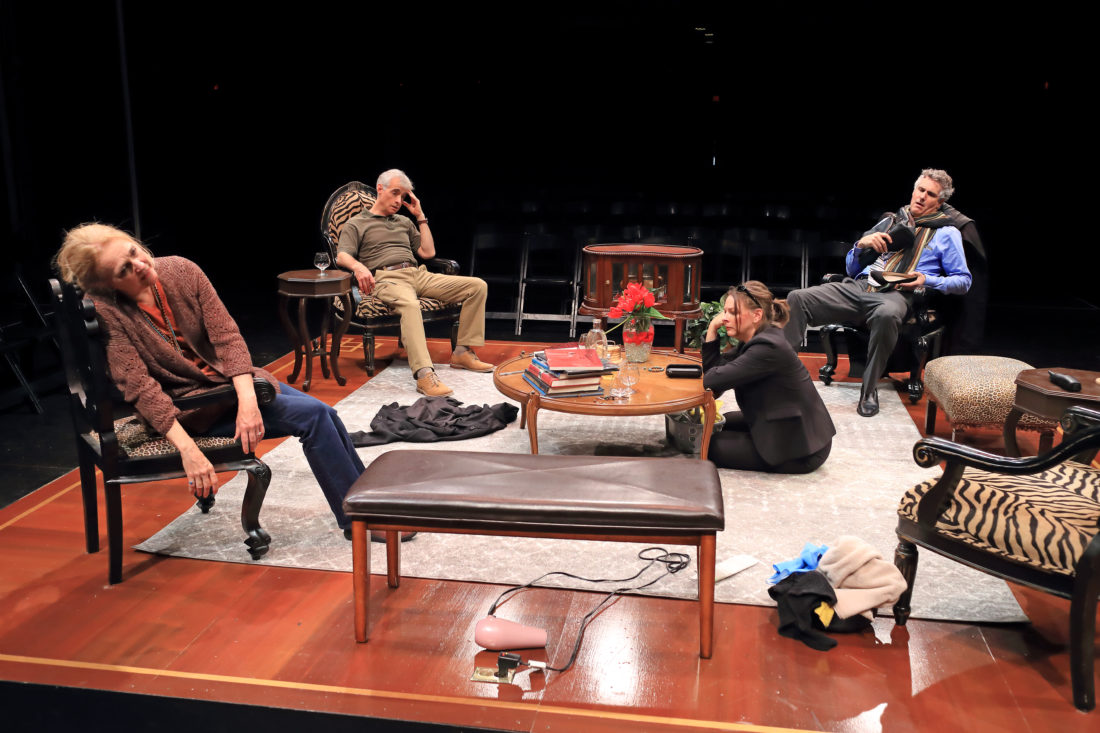There was something different about this trip to the theater.
As Ariel Casale and her fellow cast members entered the Attic Salt Theatre Company space for its production of Cry It Out, the actors were surrounded on all sides by the audience, seated mere feet away. Performers and patrons alike could have easily reached out and touched one another — not that they would. Preserving the sanctity of this shared experience seemed of utmost importance to all parties involved.
“Having the audience all around made me more aware of my movement onstage and my volume and just making sure everyone got a good look at what we were putting out there,” Casale says. “This show put us all to task to ensure we weren’t stagnant in our performances. It’s been a really cool experience.”
Actor Scott Treadway feels the same way about his ongoing role in God of Carnage, which is being staged in the round at Flat Rock Playhouse. Though not his first experience with the experimental approach, he hasn’t performed in the round in many years.
“What I love about this is there’s no [vocal] projection, there’s no mic hanging off the side of my face and I can just look my fellow actor dead in the eye and talk,” he says. “It’s so intimate and it feels so honest.”
Unlike Treadway, Cry It Out did mark Casale’s first time as an actor surrounded by an audience. The production’s last show ran Sept. 25.
“When the cast was told that was the case for this show, we were all superexcited about the possibilities and getting to be a part of a new way to be a part of and see a show,” she says. “When we started working out the blocking, it wasn’t much different from what I’ve experienced previously. But as an actor, it was an exercise in making sure that the entire audience saw the performance.”
These experimental approaches and others are being tested out at a variety of local theater companies. Between performances and preparing for their next endeavors, members from each production spoke with Xpress about pushing boundaries and the risks and rewards that stem from these efforts.
Creative choices
While previous Attic Salt shows have experimented with form — including minimalism and talking directly to the audience — they’ve been presented in traditional proscenium style, in which all play attendees are seated and facing the same direction.
Granted, the Attic Salt is not a typical theater. Instead of a proper stage, the nonprofit’s productions are performed in a studio space. Approaching Cry It Out, artistic director Jeff Catanese and the show’s director, Betsy Puckett, were forced to reckon with the venue’s inherent limitations. But instead of succumbing to those hinderances in their presentation of Molly Smith Metzler’s dramedy about the fledgling friendship between a pair of new mother neighbors, the creative pair turned those limitations into opportunities.
“When I first read Cry It Out, I wanted to create the backyard in which the action of the play takes place. I decided that the easiest way to do that in our space was to ‘fence’ it in, using the audience as the actual fence,” Catanese says. “Doing this allowed for the play to become that much more immersive for anyone watching. We’ve heard from several audience members that they felt as though they were neighbors, peering at the action from a window into someone else’s yard.”
Setting all of that up, however, posed numerous challenges. Lighting, for example, was tough. The same went for making sure the audience had good sight lines, so no section felt cheated out of the actors’ full expressiveness. Such obstacles, Catanese continues, often outweigh the rewards and prompt theater professionals to avoid such risks.
“Of course, one is also able to stage the show more real-to-life when you don’t have to worry about facing one way for the entire play,” he adds. “I think that’s part of what makes it so engrossing to the audience.”
That different brand of connection between actors and theatergoers is at the heart of what inspired Lisa K. Bryant, Flat Rock Playhouse producing artistic director, to launch the company’s Black Box Series with God of Carnage (which runs through Saturday, Oct. 8). Rather than view it and Blood Knot (which runs through Sunday, Oct. 9) from the Leiman Mainstage’s auditorium, attendees are on the stage itself, surrounding a slightly elevated, square stage from four sides.
“We all have to evolve and stay fresh in order to ensure the best possible opportunities for longevity,” Bryant says. “We love the commercial works we produce — musical comedy, farce, mysteries. But there are folks out there who crave something a little more robust in the narrative. It’s our job as professional storytellers to tell all the stories, so we’ll do that with our special Flat Rock Playhouse brand of excellence and invite our patrons to allow their curiosity to lead them into this new experience.”
Bryant is also the director of God of Carnage, French playwright Yasmina Reza’s Tony-winning, dark comedy — translated to English by Christopher Hampton — about two sets of parents who meet to discuss a fight that occurred between their 11-year-old sons. Presented without an intermission, the 80-minute show grows increasingly tense as various revelations arise and offers a distinct experience for theatergoers depending on where they sit.

“In film, the director and editor decide which ‘perspective’ they want the audience to view. It isn’t so different with proscenium theater,” Bryant says. “With theater-in-the-round, you get different perspectives per whichever side of the stage you might be sitting on, which makes the whole experience extra engaging and fun to participate in.”
Purposeful provocation
Magnetic Theatre Co-Artistic Director Katie Jones is also fond of theater-in-the-round and has thought about staging shows that way at the company’s River Arts District space, but the room is not especially conducive to the approach. Instead, she and her colleagues innovate in other ways. For example, in the upcoming production The Frankenstein Rubrics, which runs Friday, Oct. 7-Saturday, Oct. 22, the company will make creative use of a new elevated corridor that runs between the space’s two seating areas.
“We’re trying to treat it really immersively. There’s going to be seats all around, and the whole room is essentially going to be transformed into Dr. Frankenstein’s lab,” Jones says. “We’re even going to do ticket sales in the outer lobby so that there’s no ruining the magic. Once you walk through the red doors, you’re in.”
Back at Flat Rock, Bryant hopes to continue the Black Box Series as an annual offering, both with theater-in-the-round as well as “some fun other audience seating arrangements” that she and her colleagues continue to identify.
“We want to keep surprising the audience who finds this series to be a blast to participate with, and we want to keep our creatives excited about new artistic challenges year after year,” she says. “Everyone wins.”
That commitment to creativity resonates deeply with Flat Rock Playhouse stalwart Treadway, who believes that all artists deserve to have their creations given a place to be seen or heard, and that if those investments aren’t made, a disservice is being done to the entire art form.
“There’s so many people out there who want [the Black Box Series], and what they want is just as important as the people who want the comedies or the musicals,” he says. “There’s too much great work out there, and it’s not going to continue to be written or created unless playwrights have a venue to do it.”
Encouraging the long-term health of local theater is also crucial to Casale. She feels that theater-in-the-round “automatically makes going to the theater a fresh, new experience for seasoned audience members and for new folks,” and that pushing boundaries has the potential to draw in more regulars on both sides of the stage.
“Asheville’s theater scene is booming, and we have so many great spaces and talent in this city,” she says. “It’s important to continue to attract new audiences and talent by keeping it fresh.”
But while Catanese is in favor of trying new things, he cautions that there should always be a purpose behind experimentation.
“It’s not important to push boundaries in theater if you’re just talking about pushing them for push’s sake,” he says. “However, if a company wants to continue to pursue quality in their work, they have to be open-minded enough to ask in what ways their work can best be presented. If performing in the round enhances the audience experience, so be it. However, there’s a place for straight proscenium and many other kinds of stagings as well.”






Whatever happened to the theatre-in-the-round at UNCA?